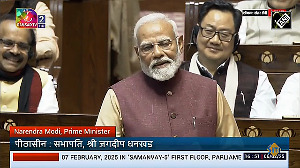Professor Zha Daojiong heads the department of International Political Economy at Renmin University, China, and is an expert on international energy security and economic diplomacy. He was recently in New Delhi to attend a seminar organised by the Institute for Defence Studies and Analyses, India's premier strategic and security studies think tank.
He is the author of The International Political Economy of China's Oil Supply Security and has co-authored Building a Neighbourly Community: Post Cold War China, Japan and South-east Asia.
Importantly, Zha is also advisor to China's ministry of commerce, ministry of foreign affairs and the Chinese Communist Party's international affairs department.
On his first ever visit to India, Zha was quite overwhelmed.
In an exclusive interview with rediff.com's Managing Editor Sheela Bhatt, Zha speaks of the complex issues related to energy security, diplomacy and economics of the region.
Since you have come here to speak on the geopolitics of the energy security issue in view of the rise of Asia, how do you see China and India's quest for energy security? Are they competing or cooperating? On the geo-political chess board of energy security how are these two countries placed?
I think you have two questions. The first is whether China and India are competing or co-operating. We need to see how India and China have managed energy security till now. Both had separate passages in the past. China had its own set of foreign policies to meet its energy needs and India managed its supply without relying on China. In future it needs to be seen if China and India, in the process of continuing to meet their respective energy needs, will or will not come across each other's interest or whether or not they intentionally step on each other's toes.
I don't really think that there is any dichotomy in competition versus co-operation. We have to evaluate both countries on a case by case basis.
Your second question regarding the geo-political chess board for the quest for energy security, I think, because of the end of the cold war and globalisation of economies it's more difficult to fashion, geo-politically, the image of using energy as a weapon or reward for good geo-political ties or deeper bilateral ties. As an example take China and Russia. As geo-political theory goes, fine, we get more pipelines and we get gas from Russia and it strengthens the relationship. But that's not necessarily true, always. Because it not only strengthens mutual reliance but it also strengthens the energy supplier's strengths and potential to use that energy pipeline as a weapon against you. That's what Russia has done! It's not just Russia. There is, I think a growing tendency of the exporting country to tell the importing country that look, because you are relying on us I have the liberty to dictate terms of supply. So there is a limited ability of geo-political thinking of using energy as a catalyst to stimulate growth.
In the seminar here there was a question, what to do with the Pakistan pipeline. Yes, there is a space for geo-political imagination for an oil and gas pipeline coming from Iran to the south that sounds interesting too. The logic is that Islamic countries can help each other and it will strengthen the hands of Pakistan to ensure that supplies reach China safely. But, there are still risks. That's why I said in at the IDSA seminar that there is no replacement for maritime transportation.
What's your take on China-India relations?
Before I comment on Chinese President Hu Jintao's recent trip to India I must say at the emotional level if we simplify the complex opinions and national views, China and India are really seeking each other out.
In other words they are searching for how to deal with each other. We have a complex history. There was a border war. We continue to have border disputes. And, mind you we are two huge continental powers. We are sitting in middle of New Delhi where things seem easy. When you think about managing the borders we have to think about realities along the border. These lines are poorly guarded and the economy is not so well-developed, social infrastructure is weak. That's true for both China and India. Then there is a domestic challenge. Before you open the borders you have to prepare your borders. That's done along the line of co-operation because you don't want to lose out. There are so many other priorities in the country. How much resources you can devote to construct the borders?
If you think along the line of confrontation, again, you have to fortify the borders first, right? How much of interest do you have? I think with that understanding, probably we are giving a lot of space to rhetoric. Encouraging and hoping that the other side will co-operate more but moving tentatively to seek each other out. The President's trip to India was a very important in sending a clear message to the entire South Asia that China treats India and Pakistan equally!
This is the first time the Chinese President has visited both countries in the same trip.
In past he has travelled separately. That itself was an important message, that we want India to feel confident that China is not using Pakistan against India, as well we want Pakistan to know that don't use China against India. That's the body language of China. The most tangible result of the Chinese President's visit to India was that both decided to give each other special treatment in business. The future contours of relations between both countries will be in business. So far, the economic link between China and India is very, very weak. So, let's see how market forces play out.
China is helping Pakistan build up its strategic weapons and intends to give them nuclear power technology. It has helped build the Gawader port. China has deep strategic ties with Pakistan. How do you answer India's concerns?
That's what happened in the past. That was the Cold War structure. Some are continuing today there are elements even in India who would like to take advantage of these ideas which are coming from America, some ideas are coming from other quarters like Japan and Europe. That idea is -- let us support India, make it strong so that India can become a counter-weight to China. It's a new kind of proxy war. We have our concerns too. So how do we address our concerns? We go back to equidistance diplomacy (between India and Pakistan).
What made China change its policy and decide to keep India and Pakistan at equidistance?
It's my understanding, and I don't represent the Chinese government, that this change represents the profound reassessment of how do we manage our neighbourhood. Look, during the Cold War we were engaged in Cambodia, we were involved in Pakistan and even to some degree we were involved in supporting Bangladesh. Now, there is Myanmar. But, it's not paying off. Because at the end of the day you may have the strategic imagination of turning some country into an enemy as if you are never going to deal with it. But globaliastion is not just a word we talk about. It's a reality. If we want to sell our products where do we sell? India has a bigger population. It's a lot easier to reach. So we want to solve cross-border problems. We have to work with India as we have to work with everybody. I have repeatedly said before that many parts of the world are affected by the American and European way of conceptualisation of international relations as geo-strategic and geo-politics issues.
Right? But there is one major blind post in the American way of thinking about managing global security. America doesn't have to deal with its neighbours as we have to! America and Iran are something on TV. Canada is so similar to America. Can Mexico challenge America? America is clearly outlined. But we are not. Whether we like it or not we have to deal with each other.
Is the reassessment of India by China an enduring one?
It will depend on a lot of factors. It will depend on how we see ourselves. How our bilateral relations with other countries go and how India deals with China. There are a lot of factors to consider. But there is a saying that you risk losing nothing by trying.
In India the big debate is on Indo-US nuclear deal and US- India strategic relations. How does China view it?
There are people in China who feel that India is willingly becoming a proxy. So far the Indian government has indicated to China that it is not the case. I personally believe that it's against India's self-interest to play that game. That is to be caught in the middle between China and the United States. There are so many things going on between China and the United States. Likewise, it's against China's interest to make India a factor in our relations with America. Like, I said at the end of the day we are neighbours. We will have to learn to live in peace. I really don't know what the future outcome will be but I don't think this argument of the US nurturing India into an effective counter-weight against China is going to materialise in the same way as the US did with some countries during the Cold War. Because now, diplomacy or military planning is about the economy, it's about employment and about creating a better society for yourself.
How do you see the potential of India, China and Russia partnership to enhance multi-polarity?
We don't talk about multi-polarity anymore! I think there is a limit to the India, China and Russia partnership to fight against the so-called unipolar America. There is a severe limit to that.
Why?
Where is Russia? (laughs loudly). What's Russia's link to India? I think it's useful for China, India and Russia to express their wishes, reservations and sense of risks through three-way talks.
In Iraq, America is facing a huge setback. In view of American weakness in Iraq, how do you see China's policy in Iran? Is China comfortable with Iran becoming a nuclear power?
This is a very sensitive question. First, I don't think the Americans have weakened on the international stage. Two, the US has some problems. As I said today, it's wrong for big powers like Europe, China and India to see it as America's problem alone.
As far as my knowledge goes China does not support Iran becoming a nuclear power.






 © 2025
© 2025